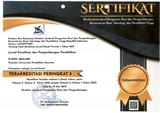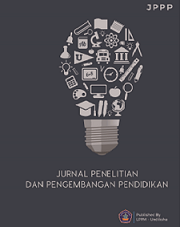Learning Tools Based on Outcome Based Education to Improve Student Learning Outcomes
DOI:
https://doi.org/10.23887/jppp.v8i1.69235Keywords:
Outcome Based Education, Learning Outcomes, Learning ToolsAbstract
Currently, high quality and competent human resources are needed in the world of work. To achieve this, activities must be achieved as early as possible, which can be started from college by applying the Outcome Based Education (OBE) learning method. This research aims to develop learning tools for scientific courses in the form of valid, practical and effective outcome based education semester learning plans to improve student learning outcomes. The learning device development model used in this research is define, design, and develop, by modifying the 4-D model (Four D model). Learning device validity data was collected by a validation questionnaire. Practicality data was collected through questionnaires on the responses of lecturers and students to learning tools, and questionnaires on the implementation of learning tools. Data analysis was carried out descriptively. Based on the research results obtained: (1) the validity of learning devices is in the valid category with a validity value of RPS 3.52, (2) the practicality of learning devices is in the very practical category with value of 3.43, the average lecturer response is 3.71 and student response is 3.54, (3) the effectiveness of learning tools is in the effective category, with an average learning achievement test score of 79.54 and completeness of 88.24%. Based on the findings of the research results, it was concluded that learning tools met the criteria of being valid, practical, and effective in improving student learning outcomes tests, so that they could be implemented in a wider scope.
References
Ahmad, S. Z. (2020). Cloud-Based Collaborative Writing to Develop EFL Students ’ Writing Quantity and Quality. International Education Studies, 13(3), 51–64. https://doi.org/10.5539/ies.v13n3p51. DOI: https://doi.org/10.5539/ies.v13n3p51
Alenezi, A. (2020). The role of e-learning materials in enhancing teaching and learning behaviors. International Journal of Information and Education Technology, 10(1), 48–56. https://doi.org/10.18178/ijiet.2020.10.1.1338. DOI: https://doi.org/10.18178/ijiet.2020.10.1.1338
Amaliyah, N. R. (2021). Penggunaan Model Pembelajaran 4.0 bagi Tenaga Pendidik Sekolah Dasar Jakarta. Didaktika Tauhidi: Jurnal Pendidikan Guru Sekolah Dasar, 8(1), 43. https://doi.org/10.30997/dt.v8i1.3342. DOI: https://doi.org/10.30997/dt.v8i1.3342
Aprilliyah. (2014). Pengembangan Media Pembelajaran Modul Interaktif Pada Materi Jurnal Khusus Kelas X Akuntansi di SMK Negeri Mojoagung. Jurnal Khusus, 2(2), 1–7. https://jurnalmahasiswa.unesa.ac.id/index.php/35/article/view/9412.
Astra, I. M., Wahyuni, C., & Nasbey, H. (2015). Improvement of Learning Process and Learning Outcomes in Physics Learning by using Collaborative Learning Model of Group Investigation at High School (grade X, SMAN 14 Jakarta). Journal of Education and Practice, 6(11), 75–80. https://eric.ed.gov/?id=EJ1081730.
Capraro, R. M., Capraro, M. M., & Morgan, J. R. (2013). STEM project-based learning an integrated science, technology, engineering, and mathematics (STEM) approach. In STEM Project-Based Learning an Integrated Science, Technology, Engineering, and Mathematics (STEM) Approach. https://doi.org/10.1007/978-94-6209-143-6. DOI: https://doi.org/10.1007/978-94-6209-143-6
Carayannis, E. G., Dezi, L., Gregori, G., & Calo, E. (2022). Smart Environments and Techno-centric and Human-Centric Innovations for Industry and Society 5.0: A Quintuple Helix Innovation System View Towards Smart, Sustainable, and Inclusive Solutions. Journal of the Knowledge Economy, 13(2), 926–955. https://doi.org/10.1007/s13132-021-00763-4. DOI: https://doi.org/10.1007/s13132-021-00763-4
Dam, M., Ottenhof, K., Van Boxtel, C., & Janssen, F. (2019). Understanding cellular respiration through simulation using lego as a concrete dynamic model. Education Sciences, 9(2), 72. https://doi.org/10.3390/educsci9020072. DOI: https://doi.org/10.3390/educsci9020072
Damit, M. A. A., Omar, M. K., & Puad, M. H. M. (2021). Issues and challenges of outcome-based education (OBE) implementation among Malaysian vocational college teachers. International Journal of Academic Research in Business and Social Sciences, 11(3), 197–211. https://doi.org/10.6007/IJARBSS/v11-i3/8624. DOI: https://doi.org/10.6007/IJARBSS/v11-i3/8624
Farihah, M. J., Norawi, A. M., & Jahan, A. N. (2021). Game-Based STEM Module Development for KSSM Science Teachers. Journal of Turkish Science Education, 18(2), 249–262. https://doi.org/10.36681/tused.2021.63 DOI: https://doi.org/10.36681/tused.2021.63
Fatimah, A. S., & Santiana, S. (2017). Teaching in 21St Century: Students-Teachers’ Perceptions of Technology Use in the Classroom. Script Journal: Journal of Linguistic and English Teaching, 2(2), 125. https://doi.org/10.24903/sj.v2i2.132 DOI: https://doi.org/10.24903/sj.v2i2.132
Frolova, E. V., & Rogach, O. V. (2021). Particularities of students perceptions of the digitalization of education: Comprehending the experience of online learning in a pandemic environment. Perspektivy Nauki i Obrazovania, 51(3). https://doi.org/10.32744/pse.2021.3.3 DOI: https://doi.org/10.32744/pse.2021.3.3
Hussin, W. N. T. W., Harun, J., & Shukor, N. A. (2018). Problem Based Learning to Enhance Students Critical Thinking Skill via Online Tools. Asian Social Science, 15(1), 14. https://doi.org/10.5539/ass.v15n1p14 DOI: https://doi.org/10.5539/ass.v15n1p14
Hwang, G. J., Chang, C. C., & Chien, S. Y. (2022). A motivational model‐based virtual reality approach to prompting learners’ sense of presence, learning achievements, and higher‐order thinking in professional safety training. British Journal of Educational Technology, 53(5). https://doi.org/10.1111/bjet.13196. DOI: https://doi.org/10.1111/bjet.13196
Isro, A. L., Anggraito, Y. U., & Bintari, S. H. (2021). Description of Students’ Critical Thinking Skills in Integrated PjBL STEM Learning Environmental Change Material. Journal of Innovative Science Education, 10(3), 237–243. https://doi.org/10.15294/jise.v10i1.43920.
Kaliannan, M., & Chandran, S. D. (2012). Empowering students through outcome-based education (OBE). Research in Education, 87(1), 50–63. https://doi.org/10.7227/RIE.87.1.4. DOI: https://doi.org/10.7227/RIE.87.1.4
Kavlu, A. (2016). Project – Based Learning Assessment Methods Comparison in Undergraduate EFL Classes of Social Sciences & Educational Studies. International Journal of Social Sciences & Educational Studies, 1(4). https://ijsses.tiu.edu.iq/wp-content/uploads/2012/07/vol-1-no-4-2015.pdf#page=47.
Kawuryan, S. P., Hastuti, W. S., & Supartinah. (2016). Pengembangan Model Pembelajaran Tematik Berbasis Permainan Tradisioanl dan Beroirientasi Pendekatan Saintifik. Jurnal Pedagogik Pendidikan Dasar, 4(1), 87–101. http://staffnew.uny.ac.id/upload/132309076/penelitian/CP_Permainan Trad.pdf.
Lee, G. L. (2022). Best practices of teaching traditional beliefs using Korean folk literature. Procedia - Social and Behavioral Sciences, 15, 417–421. https://doi.org/10.1016/j.sbspro.2011.03.114. DOI: https://doi.org/10.1016/j.sbspro.2011.03.114
Lestari, F. D., & Sari, P. M. (2021). Media Pop-Up Book Berbasis Kemampuan Higher Order Thinking Skill (Hots) pada Daur Hidup Hewan. Jurnal Edutech Undiksha, 9(2), 206. https://doi.org/10.23887/jeu.v9i2.38644. DOI: https://doi.org/10.23887/jeu.v9i2.38644
Lotter, C. R., Thompson, S., Dickenson, T. S., Smiley, W. F., Blue, G., & Rea, M. (2018). The Impact of a Practice-Teaching Professional Development Model on Teachers’ Inquiry Instruction and Inquiry Efficacy Beliefs. International Journal of Science and Mathematics Education, 16(2), 255–273. https://doi.org/10.1007/s10763-016-9779-x. DOI: https://doi.org/10.1007/s10763-016-9779-x
Melliana, Sinulingga, S., Nasution, H., & Matondang, N. (2018). Human resource competency relationship and competitive advantages in logistic performance improvement. Journal of Physics: Conference Series, 1116(2). https://doi.org/10.1088/1742-6596/1116/2/022026. DOI: https://doi.org/10.1088/1742-6596/1116/2/022026
Mustaming, A., Cholik, M., & Nurlaela, L. (2015). Pengembangan Perangkat Pembelajaran Memperbaiki Unit Kopling dan Komponen-Komponen Sistem Pengoperasiannya dengan Model Discovery Learning untuk Meningkatkan Hasil Belajar Siswa Kelas XI Otomotif SMK Negeri 2 Tarakan. Jurnal Pendidikan Vokasi: Teori Dan Praktek, 3(1), 81–95. https://jurnalmahasiswa.unesa.ac.id/index.php/32/article/view/13565.
Nicolaou, C., Matsiola, M., & Kalliris, G. (2019). Technology-enhanced learning and teaching methodologies through audiovisual media. Education Sciences, 9(3). https://doi.org/10.3390/educsci9030196. DOI: https://doi.org/10.3390/educsci9030196
Nopriana, T., Herman, T., & Martadiputra, B. A. P. (2023). Digital didactical design: The role of learning obstacles in designing combinatorics digital module for vocational students. International Journal of Interactive Mobile Technologies (IJIM), 17(02), 4–23. https://doi.org/10.3991/ijim.v17i02.34293. DOI: https://doi.org/10.3991/ijim.v17i02.34293
Nouraey, P., Al-Badi, A., Riasati, M. J., & Maata, R. L. (2020). Educational Program and Curriculum Evaluation Models: A Mini Systematic Review of the Recent Trends. Universal Journal of Educational Research, 8(9), 4048–4055. https://doi.org/10.13189/ujer.2020.080930. DOI: https://doi.org/10.13189/ujer.2020.080930
Osman, K., Hamid, S. H. A., & Hassan, A. (2009). Standard setting: Inserting domain of the 21st century thinking skills into the existing science curriculum in Malaysia. Procedia - Social and Behavioral Sciences, 1(1), 2573–2577. https://doi.org/10.1016/j.sbspro.2009.01.454. DOI: https://doi.org/10.1016/j.sbspro.2009.01.454
Pahlevi, T., Rosy, B., & Elizabeth Ranu, M. (2018). A Scientific Approach Based on Portfolio Assessment for Autonom Problem Solving. International Journal of Educational Research Review, 3(2), 29–36. https://doi.org/10.24331/ijere.406124. DOI: https://doi.org/10.24331/ijere.406124
Papadakis, S., Vaiopoulou, J., Kalogiannakis, M., & Stamovlasis, D. (2020). Developing and Exploring an Evaluation Tool for Educational Apps (ETEA) Targeting Kindergarten Chil-dren. Sustainability, 12(10), 4201. https://doi.org/10.3390/su12104201. DOI: https://doi.org/10.3390/su12104201
Potter, W. J., & Thai, C. (2019). Reviewing media literacy intervention studies for validity. Review of Communication Research, 7, 38–66. https://doi.org/10.12840/ISSN.2255-4165.018. DOI: https://doi.org/10.12840/ISSN.2255-4165.018
Pratiwi, A., Riyoko, E., & Sholeh, K. (2023). Implementasi Model Pembelajaran Project Based Learning Pada Pembelajaran IPS Abad 21 di Sekolah Dasar. INNOVATIVE: Journal of Social Science Research, 3(1), 23–32. https://doi.org/10.20527/jurmadikta.v3i1.1589. DOI: https://doi.org/10.20527/jurmadikta.v3i1.1589
Prianoto, A. D., Gulo, F., & Effendi. (2017). Pengembangan Lembar Kerja Peserta Didik (LKPD) Interaktif Kimia Untuk Pembelajaran Struktur Atom Di Kelas X Sma. Jurnal Penelitian Pendidikan Kimia, 4(2), 88–96. https://doi.org/10.36706/jppk.v4i2.8398.
Prosekov, A. Y., Morozova, I. S., & Filatova, E. V. (2020). A Case Study of Developing Research Competency in University Students. European Journal of Contemporary Education, 9(3), 592–602. https://eric.ed.gov/?id=EJ1272421. DOI: https://doi.org/10.13187/ejced.2020.3.592
Radovanović, D., Hogan, B., & Lalić, D. (2015). Overcoming digital divides in higher education: Digital literacy beyond Facebook. New Media and Society, 17(10), 1733–1749. https://doi.org/10.1177/1461444815588323. DOI: https://doi.org/10.1177/1461444815588323
Serevina, V., & Heluth, L. (2022). Development of Student’s Worksheets using Learning Strategies to Improve Thinking Ability Equipped with Mind Mapping and Ability of Student’s Retention. Journal of Physics: Conference Series, 2377(1). https://doi.org/10.1088/1742-6596/2377/1/012062. DOI: https://doi.org/10.1088/1742-6596/2377/1/012062
Suitriani, N. W., Arini, N. W., & Garminah, N. N. (2016). Penerapan Model Course Review Horay Berbantuan Media Monopoli Untuk Meningkatkan Keaktifan Dan Hasil Belajar Ipa. Mimbar PGSD Undiksha, 4(1). https://doi.org/10.23887/jjpgsd.v4i1.7271.
Taufan, M. Y. (2022). Professional Development of Teachers, Competencies, Educational Facilities and Infrastructure on Teacher Performance and Learning Achievement of High School Students in Makassar City. Golden Ratio of Social Science and Education, 2(1), 24–38. https://doi.org/10.52970/grsse.v2i1.168. DOI: https://doi.org/10.52970/grsse.v2i1.168
Thiagarajan. (1974). Instructional Development for Training Teachers of Exceptional Children. In Indiana (Issue Mc).
Tripathi, K., & Agrawal, M. (2014). Competency Based Management In Organizational Context : A Literature Review. Global Journal of Finance and Management., 6(4), 349–356. http://www.ripublication.com/gjfm-spl/gjfmv6n4_10.pdf.
Tungpalan, K. A., & Antalan, M. F. (2021). Teachers’ perception and experience on outcomes-based education implementation in Isabela State University. International Journal of Evaluation and Research in Education, 10(4), 1213–1220. https://doi.org/10.11591/IJERE.V10I4.21548. DOI: https://doi.org/10.11591/ijere.v10i4.21548
Yüksel, G., & Kavanoz, S. (2011). In Search of Pre-Service EFL Certificate Teachers’ Attitudes towards Technology. Procedia Computer Science, 3, 666–671. https://doi.org/10.1016/j.procs.2010.12.111. DOI: https://doi.org/10.1016/j.procs.2010.12.111
Yuliana, N., Purwati, N., & Hanapi, H. (2022). Improving student’s logical thinking abilities and learning outcomes through guided inquiry model. Prisma Sains: Jurnal Pengkajian Ilmu Dan Pembelajaran Matematika Dan IPA IKIP Mataram, 10(2), 345–351. https://doi.org/10.33394/j-ps.v10i2.4822. DOI: https://doi.org/10.33394/j-ps.v10i2.4822
Downloads
Published
How to Cite
Issue
Section
License
Copyright (c) 2023 Ni Nyoman Lisna Handayani, Komang Wahyu Wiguna

This work is licensed under a Creative Commons Attribution-ShareAlike 4.0 International License.
Authors who publish with the Jurnal Penelitian dan Pengembangan Pendidikan agree to the following terms:
- Authors retain copyright and grant the journal the right of first publication with the work simultaneously licensed under a Creative Commons Attribution License (CC BY-SA 4.0) that allows others to share the work with an acknowledgment of the work's authorship and initial publication in this journal.
- Authors are able to enter into separate, additional contractual arrangements for the non-exclusive distribution of the journal's published version of the work (e.g., post it to an institutional repository or publish it in a book), with an acknowledgment of its initial publication in this journal.
- Authors are permitted and encouraged to post their work online (e.g., in institutional repositories or on their website) prior to and during the submission process, as it can lead to productive exchanges, as well as earlier and greater citation of published work. (See The Effect of Open Access)







